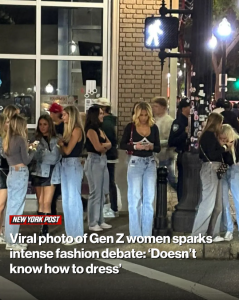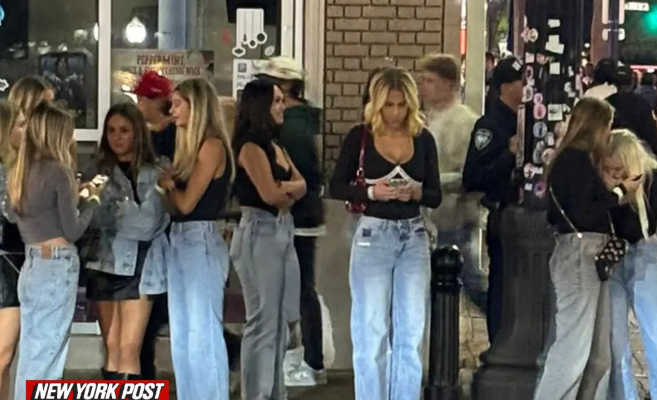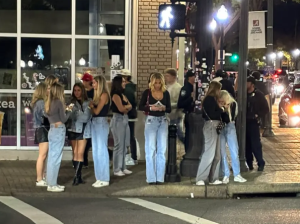
✅ 1. The Viral Moment: What Happened?
-
A photo posted on X (formerly Twitter) by user @rwxoxo shows nine women dressed in baggy light‑wash jeans and dark-colored tops, apparently getting ready for a night out.
-
The post asked: “Does anyone have any theories as to how light‑wash jeans became considered evening wear? Past 6 pm especially in the colder months, you would rarely see lighter than an indigo.”The post went viral—garnering millions of views and hundreds of replies, igniting widespread discussion across platforms.
🗣️ 2. Reactions & Commentary: Divided by Generation
From Older Generations:
-
Many older commenters criticized the image, claiming Gen Z lacks understanding of dress codes:
“Gen Z doesn’t know how to dress for different times of day or evening yet.”One user lamented: “We may have dressed badly, but at least we had some PERSONALITY!
From Gen Z and Supporters:
-
Many defended the look as practical and style-savvy in its own right: comfort-driven and unapologetically casual.
-
Comments emphasized “Zero forms of etiquette exist anymore”, viewing dress codes as outdated
-
Others noted post-pandemic shifts toward more relaxed evening attire—Gen Z values authenticity and comfort
👗 3. Expert Insights: Stylists Weigh In
Tina Grasso (Chouchou Intimates)
-
Described the light-wash denim trend as a nod to ’90s aesthetics, referencing Cindy Crawford and similar icons.
-
She suggested that the uniformity is less conformism and more break from societal expectations—wearing jeans to bars as subtle rebellion
Rebekah Roy (UK stylist)
-
Remarked that although the outfits appear identical, each woman has small individuality—a unique bag, jacket, or accessory.
-
Highlighted how Gen Z merges comfort and self-expression—favoring pieces that feel emotionally grounded.
Lauren Walsh (stylist quoted)
-
Explained Gen Z less invested in fashion etiquette—believing all denim is casual
-
She sees the trend as focused on comfort over structure, challenging older rules about evening attire.
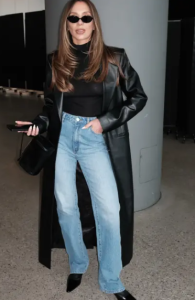
💡 4. Contextual Fashion Trends: Why It Matters
📌 Trend Cycles & Social Media
-
As noted in Indian Express: Gen Z style is heavily influenced by social media—Pinterest, TikTok, Instagram—with algorithms pushing identical aesthetics globallyViral micro-looks like “clean girl” or genre aesthetics blur identities into uniform templates
👖 Denim Dynamics
-
News observed a shift toward baggy, light‑wash, wide‑leg styles and away from skinny, dark jeans, with Gen Z favoring softer, relaxed fitsOnce a rule-bound fabric (dark denim for night, light for day), now it’s worn cross-context—reflecting changing norms.
🎭 Rebellion Meets Comfort
-
Post-pandemic culture placed emphasis on comfort—sweats, athleisure, relaxed silhouettes. Light denim is a natural extension of that.
📊 5. Breaking It Down: The Controversy Table
| Issue | Traditional View | Gen Z Perspective |
|---|---|---|
| Evening denim | Dark wash or dressier fabrics preferred after 6 pm | Any wash if styled confidently |
| Uniformity | Avoid matching outfits—you lose personal identity | Trends foster collective identity and comfort |
| Style rules | Fashion etiquette dictates day vs. night separations | Rules are outdated; style is personal and flexible |
| Influence origin | Style influenced by formal/fixed codes or culture | Driven by social media, algorithms, influencer culture |
| Comfort vs. dress | Night wear requires deliberate dressing up | Comfort, authenticity, and ease are central |
🧠 6. Deeper Debate: Does Gen Z Know How to Dress?
Critics’ Viewpoint:
-
Some argue Gen Z doesn’t differentiate between day and evening wear.
-
Critics say the trend erases individual style in favor of mass aesthetic uniformity.
Counterarguments:
-
Others counter that Gen Z is creating their own fashion norms, where comfort and co‑ordination matter more than historical rules.
-
Stylists and Gen Z influencers see the coordinated look as deliberate—less uniformity for conformity, more for aesthetic unity.
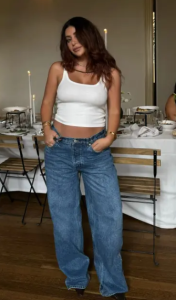
🌍 7. The Broader Cultural Lens
-
This debate taps into a broader discussion on how fashion defines identity, especially when older generations value distinctiveness and fierceness.
-
The generational tension echoes earlier shifts—bell-bottoms in the 70s, low-rise jeans in the 2000s—but what defines rebellion today is often algorithm-driven sameness
-
As Byrdie’s article on It‑Girls suggests, a new style era is emerging—less perfection, more personality—even if people dress alike visually
🤔 8. Final Thoughts: What This Debate Reveals
-
Fashion has always been generational, evolving, and contested. This viral photo simply amplifies those tensions in real time.
-
For some, it’s a decline of style discipline. For others, it’s a redefinition of comfort, solidarity, and self-presentation.
-
The real heart of the debate? Whether style rules matter—or whether fashion is more about belonging than distinguishing.
